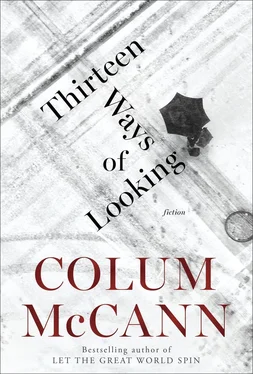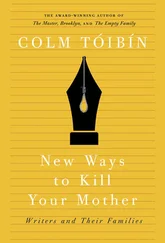A sharp breath escapes her: Oh, I missed mass. The first time in my life. I missed mass, Ian. I can’t believe I missed it.
— You’ve been traveling.
— I’m tired, Ian. So very, very tired.
She lifts the saucer toward the teacup to calm the shake in her hands.
— I’m sure there’s some sort of dispensation, isn’t there? Isn’t there some sort of Catholic word?
He toes around in his books as if he might find the word in the mess on the floor.
— Indulgence, he says, snapping his fingers. Isn’t that it? Indulgence?
—
SHE WAKES IN HIS BED: she has never once slept in a double bed before. An indulgence, yes. She stumbles, fully clothed, to the window, parts the blinds to the yellow streetlight. A sheen of wet on the ground. The light skids in patches along the footpath. She hears the laughter of two young women, tottering arm in arm down the street. A black taxi cab trawls slowly through the rain. Monday morning. A plenary indulgence.
In the corridor she hears the whirr of a computer printer. A light leaks out from a gap in the living-room door. Through the gap she sees Ian caught in a blue light, books scattered around him, bent into whatever work is at hand.
She returns to her room, kneels at the bed for her morning lauds. For the needs of those who are confused. For the needs of those who are without hope. For the needs of those who have no one to pray for them.
It is still dark when she hears the clatter of cutlery and the whistle of the kettle. He sits bleary-eyed at the breakfast table.
— For you, he says, guiding a file across the Formica table.
She fingers the sharp edge of the folder, then turns to the first page. Ian has printed out all the information he can find from the Internet. Three pictures of Carlos, one a headshot, one with government ministers, one taken outside the Institute for Peace.
— His name is Euclides Largo. I mean, that’s what he calls himself.
— Euclides.
— Fifty-nine years old. He’s with a small left-wing party.
— That can’t be.
— I’ve been researching all night. They’ve a lot of support in the countryside, it seems. They’re left wing.
— But he’s right wing. I mean that’s…
— Go figure.
— Are they Catholic, his party?
— They don’t seem — I don’t know, I don’t think so. Who knows? I’m sorry, Bev. All I can tell is that he’s moved up through the ranks over the years.
A surge of bitterness at the base of her spine.
— He was a lawyer before he got into politics. His main thrust is coal mining. He represents the miners. Copper deposits, corporate access to the mines, that sort of thing. He makes his argument for peace on the basis of economics.
She drags the file a little closer and runs her fingers along the edge of his photograph. She has a sudden urge for a cigarette: she has not craved one in days.
To smoke, to cough, to burn and disappear.
— It’s him.
— Are you sure?
She is pierced by the thought that it is all a delusion stacked against her faith, a test of her ability to believe.
— Sure as God, she says.
— You could go to the newspapers.
— And what?
— I can call some friends at the radio station. The embassy. You should call the embassy—
— And say what?
— He raped you, Bev.
— Thirty-seven years ago.
A trapezoid of morning light crosses the kitchen floor. She hears a shout from farther along the street and a blast of laughter, then the smash of a bottle on the pavement: so early, so late.
Ian rises to the kitchen window to part the curtains to look down the length of the street.
— Hooligans, he says.
He waits at the curtains, opening and closing them as if there is some Morse code that he might reveal to the street below.
— You don’t still smoke, do you? she asks.
He shuffles into the living room, returns moments later with a small blue bag of tobacco and rolling papers. He fumbles with the paper, licks the edge, smooths it down, passes her the roll-up, takes a box of matches from the kitchen drawer. The smell of sulfur jags her awake.
—
IT IS A FOUR-STORY townhouse fronted by a black ironwork fence, on the eastern side of the river. The walls of the Institute look recently painted, perfectly white. Flowerpots in the windowsills with red flowers, hydrangeas. A large brass plate on the wall. She had expected something grander, more surprising. Nobody gathered outside. No mothers with placards. No cameras or waiting limousines.
A feeble rain drizzles down. She stands at the curb and looks up to see the dark outline of a lamp in the front window. The vague shadows of figures crossing and recrossing the room. It strikes her as a place more of silence than peace. She is at the door before she even catches herself. Her hand on the intercom button. The buzzer sounds. She glances up at the security camera. A silence and then a second buzzing. Longer, more insistent, impatient even.
— Can I help you?
What vanity brought me here, what conceit? She sees a shape in the window, someone looking out at her.
— Sorry, she says into the intercom.
She turns her face into her damp headscarf, descends the steps, walks quickly away, an old woman, the cost weighed in every tendon.
At a corner sandwich shop, she stops. Newspapers on a rack outside. An Irish paper too: she has not seen one in many years. The red light of a camera blinks as she steps inside. She buys the paper and a coffee, sits at the counter to read.
From a distance she watches the front of the Institute, the quiet comings and goings, the shapes of shapes.
The hours drift. The shop is quiet. She scans the paper, even the sports pages, but cannot recall a single word of what she has read.
In the late afternoon she stops at the church in Westminster. From his accent the priest is young, African. Formal. Correct. Mannered. Even in the darkness she can tell he is one who stiffens his collar. She has, she says, failed in the most ordinary way to embrace forgiveness. She has lied about her whereabouts to others. She has failed His grace. She has spent her time in sloth. She has not sought out her fellow Sisters in London, nor any solace from her family within the Church. She has missed her duties: mass, prayer, the holy sacrament. She is unsure now if any of her service is toward the Lord.
It is, in the end, she thinks, the shallowest of confessions: all of the truth, none of the honesty.
After penance, she wanders out into the city, along the Thames. The river sweeps by, turbulent and bulging, but without sound.
In Ian’s apartment she moves out from his room, allows him his double bed. She takes a blanket to the couch. She sleeps, surrounded by books.
—
BEVERLY REPEATS THE RITUAL three days in a row, standing outside the Institute, waiting, watching, shuffling away, her headscarf pulled tight. In the sandwich shop she sits on a swivel stool at the counter, from which she can see through the window the length of the street. Always a flurry of activity in the morning. Black cars. A series of shapes hustling up the steps. The lights inside flickering on and off. At lunchtime, too, the men and women coming down the steps. From a distance any number of them could be him. In the evening, when the dark descends, it is harder to tell, the street shiny with rain, the lamplight carrying the shapes away.
It seems to her that she could sit here for seasons on end: watching the street leaf and unleaf itself.
Decades ago, in Bogotá, there had been a time when she waited for a bus to return her to the village. She remained in the station for two and a half days. Diesel fumes. The screech of brakes. She sat on a wooden bench, clutching her ticket. She had not eaten and carried only a small flask of water. She read from the scriptures. Peter the Apostle. Manacled to that same post. The Mamertine.
Читать дальше












